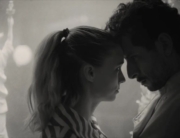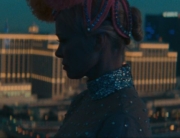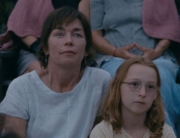The Disappearance of Eleanor Rigby is a film trilogy whose first two parts, subtitled Him and Her, had an unconventional side-by-side premiere at the Toronto International Film Festival last year. The driving idea is that each part is told from the perspective of one half of the starring couple, played by the talented duo James McAvoy and Jessica Chastain. The plot is a fairly straightforward tragic romance, with hints of comedy, made noteworthy by its two-part structure.
This September, however, U.S. audiences will be first offered their amalgamation in an additional third part, subtitled Them, which combines the initial two into a more traditionally structured film. This third installment, intended to conform to a generic distribution model, sadly has few distinguishing characteristics and offers little more than a mediocre drama of a passionately married couple that, under tragic circumstances, can no longer be happy together.
At one point, Chastain’s Eleanor Rigby playfully admits to McAvoy’s Conner to feeling as if they were running the gamut of romantic clichés—an apt description for the film, which tiresomely adheres to a well-known checklist of post break-up film scenarios. McAvoy and Chastain are nevertheless strong actors who fully commit to bringing nuance and charm to these predictable situations. They, unfortunately, succeed only every so often and not enough to save the film.
Chastain is as serious and austere as in her Oscar-nominated performance in Zero Dark Thirty, and McAvoy plays a similarly conflicted, angry, but tender lover as in Atonement—only more cynical and exhausted. Everyone appears tired, though. Even the lively, fiery Isabelle Huppert, as Eleanor’s fellow redheaded French mother has been quelled by too many glasses of wine. This all may have more palatable if the editing had indeed experimented with subjectivity. Instead, by combining the two perspectives, Them not only loses all of its novelty but also lacks fluidity, and is only visually pleasing in its long takes in which the camera lets the actors be their indisputably appealing, photogenic selves.
The lucky first-time director Ned Benson was able to not only cast top actors as his leads but also lock down in supporting roles the likes of French superstar Huppert, Oscar winner William Hurt as Eleanor’s father, and Oscar nominee Viola Davis, the most convincing of the three, as a jaded university professor who advises Eleanor to return to Paris and resume work on her abandoned dissertation.
Yet the supporting highlight is Saturday Night Live alum Bill Hader, who brightens the film with his endearing, well-meaning awkwardness. He may even have better chemistry with McAvoy than Chastain does, and their scenes sell a buddy comedy better than the film does a lovers’ drama. Benson secured these actors via his leading lady and real-life best friend, Chastain, whom he met at a film festival back when she was a struggling actress. It was her contribution that gave birth to the idea of a multiperspective, multipart film, and he wrote the script with her continual input.
There may have been more nuances to watching the story twice, each time from a different point of view. That, at least, may have served as an interesting commentary on cinema’s ability to capture the subjectivity of experience (and love) and the difficulties of mutual understanding, specifically in the face of tragedy. This is all guest work, given that I have seen neither of the original two films and have been privy only to the more conventional Them, which struggles to cohere the two points of view into a single film that works.
At a post-screening Q&A, Chastain, while displaying a face of mild disgust, confessed to not being a fan of this third cut, and said she is fighting “tooth and nail” to release the first two films untouched. However, she was finally convinced of the present method of release by heavyweight producer and studio executive Harvey Weinstein, who persuaded her that this third film would play as an advertisement for the first two, which will be released a month later on October 10th. Only time will tell. The mere concept of this film series is quite possibly sufficiently intriguing to draw audiences to the Him and Her segments of The Disappearance of Eleanor Rigby. Them, sadly, fails to pique much.






Leave A Comment